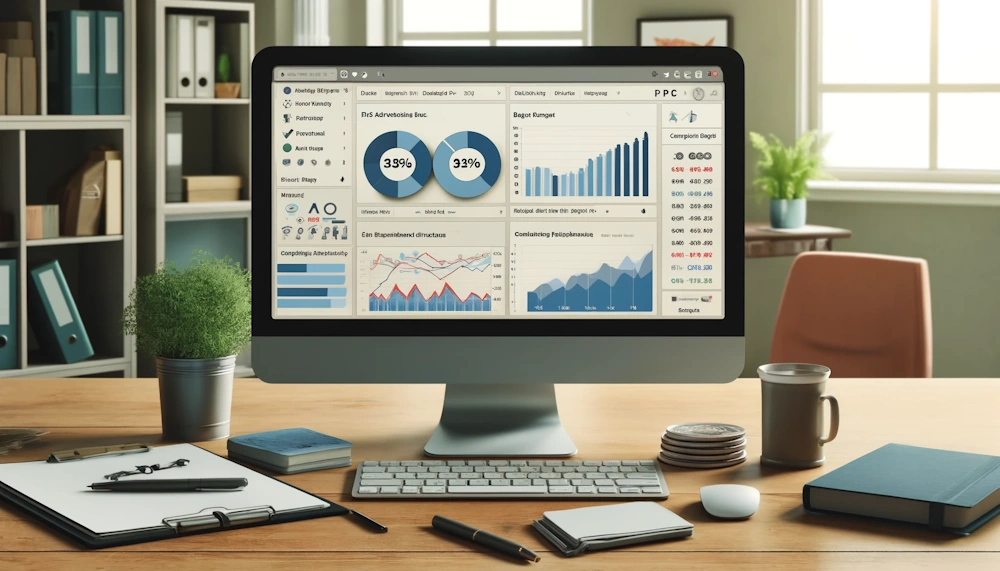Understanding PPC Budgets: A Beginner’s Guide to Mastering Your Marketing Pounds

Pay-Per-Click (PPC) advertising can be daunting for beginners, but with the right strategies, understanding PPC budgets, and budget control, it can become a powerful tool in your marketing arsenal. This guide aims to demystify PPC advertising and provide you with a foundational understanding of how to manage your marketing pounds effectively. From setting up your budget to crafting impactful ad copy and optimising your campaigns, this article will walk you through the essential steps to mastering PPC advertising.
Key Takeaways
- Establish clear advertising goals and understand the difference between daily and campaign budgets to set a solid foundation for your PPC budget.
- Utilise keyword research tools and competitor analysis to select high-impact keywords, balancing broad reach with targeted specificity.
- Create compelling PPC ad copy with attention-grabbing headlines, action-driven descriptions, and clear calls-to-action to boost conversions.
- Monitor performance metrics and adjust your campaigns through A/B testing to enhance ad effectiveness and make informed budget decisions.
- Consider partnering with a PPC agency to gain access to specialised knowledge, strategic management, and continuous campaign optimisation for better ROI.
A Beginner’s Guide to Understanding PPC Budgets: Laying the Foundation – Setting Up Your PPC Budget
Determining Your Advertising Goals
Before you dive into the world of PPC, it’s crucial to set clear, measurable goals. Ask yourself, what do you want to achieve with your ads? Whether it’s increasing website traffic, generating leads, or boosting sales, your objectives will shape your entire campaign strategy. Establishing goal metrics is just as important as the goals themselves. These metrics will serve as your campaign’s compass, helping you navigate through the data and make informed decisions.
Consider your target audience and how they interact with your brand throughout the sales funnel. Your ad parameters should include who you want to target, the theme of your campaign, how you will measure success, and the type of campaign you will run. A well-defined target audience ensures that your PPC efforts are not just a shot in the dark but a strategic move towards growth.
When setting up your PPC campaign, always align your advertising goals with your overall business objectives. This alignment ensures that every pound spent contributes to your long-term success.
Lastly, choose your campaign type wisely. Whether you’re considering search ads, display ads, or a mix of different types, it’s essential to start small and adjust your strategy over time. Remember, the flexibility to test and revise is the beauty of PPC advertising.
A Beginner’s Guide to Understanding PPC Budgets: Allocating Funds – Daily vs. Campaign Budgets
When diving into the world of PPC advertising, understanding how to allocate your funds between daily and campaign budgets is crucial. Daily budgets cap the amount you’re willing to spend each day, providing a safety net to prevent overspending. On the other hand, a campaign budget is the total amount you’re willing to allocate for the entire duration of a campaign. It’s essential to strike a balance that aligns with your advertising goals and cash flow.
Consider the following when setting your budgets:
- Daily Budget: Set a limit that allows for sufficient ad exposure without exhausting funds too quickly.
- Campaign Budget: Ensure it covers the expected duration of the campaign and accounts for potential scaling.
By setting your daily budget 50-100% higher than the recommended amount, you give your campaigns room to perform and gather valuable data without prematurely capping exposure.
Keep in mind that bid strategies also play a pivotal role in budget allocation. Manual bidding gives you control over bid amounts for specific keywords, while automated strategies adjust bids based on the likelihood of achieving your advertising goals. It’s a delicate balance of control and efficiency, and your choice should reflect your comfort with ongoing campaign management and your desire to leverage PPC platform algorithms.
Understanding Bid Strategies: Manual vs. Automated
When diving into the world of PPC, particularly with Google ads PPC and Google Adwords PPC, you’ll encounter a critical decision: choosing between manual and automated bid strategies. Manual targeting requires a proactive approach, where you select and adjust bids for specific keywords. It’s a hands-on method that demands constant vigilance but rewards you with finely-tuned control over your ad spend.
On the flip side, automated bidding leverages algorithms to optimise your bids in real-time, aiming to achieve the best possible results based on your set goals. While this approach can save you time, it may sometimes lack the precision of manual adjustments.
To strike a balance, consider starting with manual bidding to gain insights into your campaign’s performance. Once you’ve established a baseline, experiment with automated strategies to enhance efficiency and potentially improve outcomes.
Here’s a quick comparison to help you decide:
- Manual Bidding: Greater control, requires more attention, potentially lower long-term costs.
- Automated Bidding: Time-saving, relies on algorithms, may lead to higher costs if not monitored closely.
Ultimately, the choice hinges on your comfort with data analysis, your campaign’s complexity, and the time you can dedicate to PPC management. Whichever path you choose, ensure it aligns with your advertising goals and budget constraints.
A Beginner’s Guide to Understanding PPC Budgets: Keyword Conquest – Research and Selection for Maximum Impact
Mastering Keyword Research Tools
Embarking on the journey of PPC advertising, you’ll quickly realise the pivotal role of keyword research. The right tools can transform your campaign from guesswork to precision targeting. Begin by selecting a robust keyword research tool, such as Keyword Scout, which offers comprehensive data and actionable insights. With these tools, you can generate a list of keywords that align with your product offerings and target audience.
Keyword research is not a one-time task; it’s an ongoing process that evolves with your campaign. As you gather data, refine your keyword list by identifying high-performing keywords—those that achieve significant clicks and maintain an acceptable cost-per-sale or conversion rate. Here’s a simple process to follow:
- Log into your chosen keyword tool and conduct an initial search.
- Download the results into a CSV file for easy manipulation and tracking.
- Analyse the data to identify both broad and specific keywords that are relevant to your ads.
- Continuously add new, promising keywords to your campaigns as you discover them.
By methodically researching and updating your keyword list, you ensure that your PPC ads remain relevant and effective, maximising your marketing pounds.
Remember, the goal is to strike a balance between reach and relevance. Broad keywords may attract more traffic, but specific keywords often lead to higher conversion rates. Use your keyword research tool to navigate this spectrum and find the sweet spot for your campaigns.
A Beginner’s Guide to Understanding PPC Budgets: Analysing Competitor Keyword Strategies
To outmaneuver your competition in PPC, you must delve into their keyword strategies with the precision of a detective. Start with a Reverse ASIN lookup, a powerful tool that unveils the keywords your competitors rank for. This insight is invaluable, as it allows you to understand the landscape and identify gaps in your own strategy.
Craft a list of high-performing keywords from your competitors’ campaigns. These are the terms that not only attract clicks but also align with acceptable advertising cost of sales (ACoS) or conversion rates. Here’s a simple approach to categorise these keywords:
- High Clicks & Low ACoS: Prime candidates for your campaign
- High Clicks & High ACoS: Monitor closely for potential
- Low Clicks: Consider for long-tail strategy or discard
By analysing both high and poor-performing keywords, you can refine your bids, add negative targeting to avoid irrelevant traffic, and optimise your ad spend.
Remember, differentiation is key. While you should learn from your competitors, strive to stand out. Can you offer something unique or a more compelling price point? This is not just about matching strategies, but about finding and exploiting your unique selling proposition.
Balancing Broad and Specific Keywords
For PPC advertising, the equilibrium between broad and specific keywords is pivotal. Broad keywords maximise your visibility, casting a wide net to capture a diverse audience. However, they often bring less targeted traffic and can lead to higher costs without the desired conversion rates. On the flip side, specific keywords, or long-tail keywords, connect you with users who have a clear intent, increasing the likelihood of conversions but limiting reach.
To strike the right balance, consider the user’s journey. Early in their search, broad keywords may introduce your brand, while specific keywords can capture them at the moment of decision-making.
Here’s a simple approach to refine your keyword strategy:
- Review your keyword performance regularly to identify which terms bring valuable traffic.
- Adjust bids accordingly, investing more in high-performing keywords.
- Use match types strategically, from broad to exact, to control how closely your ads align with search queries.
- Don’t overlook the power of negative keywords to filter out irrelevant traffic and sharpen your focus.
Remember, the goal is not just to attract clicks, but to attract clicks that convert. By continuously analysing and adjusting your keyword mix, you can optimise your PPC campaigns for both reach and relevance.
A Beginner’s Guide to Understanding PPC Budgets: Crafting Compelling PPC Ad Copy
Writing Headlines That Capture Attention
Crafting headlines that stop scrollers in their tracks is a critical skill in PPC advertising. Your headline is the gateway to your ad’s message, so it must be compelling. Start by speaking directly to your target persona, ensuring that the headline resonates with their needs and desires. Include the main keyword you’re bidding on to maintain relevance and improve Quality Score.
The headline should mirror the promise of your ad’s landing page, creating a seamless transition for the user. This congruence increases the likelihood of conversion, as visitors feel they’ve landed in the right place.
Remember to keep your headlines concise yet powerful. Use actionable language that encourages the searcher to take the next step. Here’s a simple checklist to guide you:
- Reflect your unique selling proposition (USP)
- Evoke emotion or curiosity
- Incorporate numbers or statistics when possible
- Test multiple variations through A/B testing
By following these guidelines, you’ll be well on your way to writing headlines that not only capture attention but also drive action.
A Beginner’s Guide to Understanding PPC Budgets: Developing Descriptions That Drive Action
When crafting your PPC ad descriptions, it’s crucial to convey the unique value of your product or service. Focus on the benefits, not just the features, to illustrate how it solves a problem or enhances the customer’s life. Use persuasive language that speaks directly to the reader’s needs and desires, creating a sense of urgency and exclusivity.
Consider the following elements to include in your description:
- Product details: name, brand, model number, size, or color.
- Key features and their direct benefits.
- Any additional components or accessories included.
- Clear shipping options and return policy.
- Available promotions or discounts.
By integrating these elements, your description becomes a powerful tool that informs and motivates. It should answer potential questions preemptively, reducing barriers to conversion.
Ensure your descriptions are accessible to all users. Utilise alt tags for any visual elements and maintain a readable font size. Structure your content in short, digestible sentences and paragraphs. This not only aids readability but also caters to users with screen readers, expanding your reach to a wider audience.
Remember, the goal is to make the reader feel that they are making the right choice by choosing your product. Include unique details or stories that resonate with your target audience, and don’t shy away from highlighting what sets you apart from competitors. A well-crafted description is a stepping stone towards a successful conversion.
Utilising Calls-to-Action for Conversion Optimisation
Your call-to-action (CTA) is a crucial moment where browsing transforms into action. Craft a CTA that resonates with your audience’s desires and compels them to click. It’s not just about telling them what to do; it’s about making the next step irresistible.
Consider these elements when optimising your CTAs for conversion:
- Speak directly to your target persona.
- Include the main keyword that you’re bidding on.
- Provide an actionable CTA so the searcher knows what to do next.
- Make the offer appealing.
- Use language that matches your landing page copy.
- Perform A/B split tests with your copy to find what resonates best.
By continuously refining your CTAs through A/B testing and aligning them with your landing page, you create a seamless user experience that not only attracts but also retains customer interest.
Remember, a well-optimised CTA goes beyond mere words; it’s a strategic tool that bridges the gap between interest and conversion. Utilise analytics tools like Google Analytics and heat mapping software to gain insights into how users interact with your CTAs. This data-driven approach can lead to significant improvements in your conversion rates.
A Beginner’s Guide to Understanding of PPC Budgets: Monitoring and Adjusting – The Art of PPC Campaign Management
Tracking Performance Metrics
In the realm of PPC management, vigilance is key. You must keep a close eye on a variety of performance metrics to ensure your campaigns are hitting their targets. Conversion rate is a critical metric, revealing the effectiveness of your landing pages and ad copy in turning clicks into customers. By placing a tracking code on your post-conversion ‘Thank You’ page, you can gather invaluable data to refine your approach.
But don’t stop there. A comprehensive PPC audit should include an analysis of metrics beyond the conversion rate. Consider the balance between Clickthrough Rate (CTR) and Return on Ad Spend (ROAS) to gauge not just the quantity, but the quality of traffic your ads attract. Here’s a snapshot of essential metrics to monitor:
| Metric | Why It Matters |
|---|---|
| CTR | Measures ad engagement |
| ROAS | Indicates financial efficiency |
| Impressions | Reflects ad visibility |
| CPC | Costs of attracting clicks |
It’s crucial to optimise campaigns continuously, making data-driven decisions to enhance performance. Strive for a harmony between clicks and conversions, ensuring your ads drive not just traffic, but valuable sales.
A Beginner’s Guide to Understanding PPC Budgets: Conducting A/B Testing for Ad Optimisation
A/B testing is an important step in refining your PPC campaigns. By comparing two versions of your ad, you can discern which elements resonate with your audience and drive conversions. Start by isolating variables such as headlines, descriptions, landing pages, and Google ads audit keywords. Minor adjustments to any of these can lead to significant improvements in performance.
When conducting A/B tests, adhere to a structured approach:
- Test one element at a time to pinpoint what influences outcomes.
- Use a sufficient sample size to ensure statistical significance.
- Allow the test to run for an adequate period to collect meaningful data.
Blockquote: Always prioritise your tests based on potential impact. This ensures that your efforts are focused on changes that could yield the most substantial benefits.
Remember, the ultimate goal is to enhance both clickthrough and conversion rates. After identifying the more successful ad variant, implement the winning elements and continue to test other components. This cycle of testing and optimisation is crucial for maximising your ROI and should be an ongoing process within your PPC strategy.
When to Scale Up or Pare Down Your Ads
Deciding when to amplify or reduce your PPC efforts is crucial for maintaining a cost-effective strategy. Scale up your campaigns when you’re seeing positive ROI and consistent conversion rates. This is a sign that your ads are resonating with your audience and driving the desired actions. Conversely, it’s time to pare down when your ads are not meeting performance benchmarks or the cost per acquisition becomes unsustainable.
Size ad groups based on conversion volume: Start with the ad group size that allows you to get at least 50 conversions in the first 30 days to perform best. If your ad groups are too large, they may become unwieldy and less targeted. On the other hand, very small ad groups might not gather enough data for meaningful insights.
Adjusting your bids is an ongoing process. Use bid adjustments to fine-tune your campaigns based on performance data. Increase bids for high-performing segments and decrease for underperforming ones. Remember, the goal is to maximise your ad spend efficiency.
Finally, consider the type of campaign you’re running. Different campaign types may require different scaling approaches. For instance, programmatic advertising allows for efficient scaling due to real-time bidding and precise targeting. Keep a close eye on your campaign parameters and adjust as needed to align with your overall business goals.
A Beginner’s Guide to Understanding PPC Budgets: Leveraging Expertise – The Advantages of Partnering with a PPC Agency
Access to Specialised Knowledge and Tools
When you partner with a PPC agency, you’re not just hiring another company; you’re gaining access to a treasure trove of specialised knowledge and cutting-edge tools. These resources are often out of reach for individual advertisers or small businesses, but they can be game-changers in the hands of experts.
PPC agencies bring to the table a suite of proprietary software, analytical tools, and market intelligence that can provide deeper insights into your campaigns. With these tools, agencies can swiftly identify trends, optimise bids, and uncover new opportunities for your ads to shine.
The right agency will not only use these tools to your advantage but will also empower you with knowledge, helping you understand the why and how behind each campaign decision. This collaborative approach can significantly enhance your marketing efforts and ultimately, your return on investment.
A Beginner’s Guide to Understanding PPC Budgets: Strategic Management for Better ROI
When you partner with a PPC agency, you’re investing in strategic management that’s designed to maximise your return on investment. A PPC agency, with its pulse on one of the world’s most dynamic advertising markets, can offer insights that go beyond generic strategies. They tailor campaigns to your unique business needs, ensuring every penny is positioned for optimal impact.
- Analyse and adjust bids for cost-efficiency
- Optimise ad scheduling to target peak audience times
- Refine targeting to reach the most relevant prospects
By entrusting your campaigns to a PPC ad agency, you’re not just outsourcing tasks; you’re enhancing your marketing with expertise that drives growth.
Remember, strategic management is not a set-and-forget endeavor. It requires continuous monitoring, analysis, and refinement to stay ahead of market trends and maintain a competitive edge. With the right agency, your PPC campaigns can become a powerful tool for business success.
Continuous Optimisation and Industry Insights
In the dynamic realm of PPC advertising, continuous optimisation is not just a best practice—it’s a necessity. Partnering with a PPC eCommerce agency ensures that your campaigns are always at the forefront of industry trends and algorithm changes. Google ads agencies specialise in real-time adjustments, leveraging data-driven insights to refine your strategies for peak performance.
With a focus on eCommerce ppc, these agencies provide a tailored approach, ensuring that every pound you invest is working its hardest for your business.
Google advertising agencies bring a wealth of knowledge to the table, often having access to beta features and advanced tools before they become widely available. This insider advantage can be the difference between a good campaign and a great one. Below is a list of key benefits you can expect when partnering with a dedicated agency:
- Access to cutting-edge technology and proprietary software
- Strategic bid management and keyword optimisation
- Regular reporting and actionable insights
- Expert campaign management to maximise ROI
Remember, the landscape of digital advertising is ever-evolving. By aligning with experts who eat, sleep, and breathe PPC, you’re positioning your brand to not only keep up but to lead the pack.
Conclusion: A Beginner’s Guide to Understanding PPC Budgets
As we’ve navigated the intricacies of PPC advertising, it’s clear that mastering your marketing pounds is both an art and a science. From setting realistic budgets to crafting compelling ad copy, and managing your campaigns with precision, every step is crucial to achieving a high ROI. Remember, while PPC can seem daunting, it offers unparalleled control and the ability to target your ideal customers effectively. If you’re just starting out or looking to refine your skills, consider the support of a PPC agency to leverage their expertise and resources. With the right approach and tools, such as The Ultimate Google Ads PPC Kit, you’re well-equipped to transform your paid advertising efforts into tangible results. So, take the plunge, apply these strategies, and watch your business grow. Go paid, and go confidently!
Frequently Asked Questions
How do I set a PPC budget as a beginner?
Start by defining your advertising goals and how much you’re willing to spend to achieve them. Research industry standards, consider your business size, and set daily budgets 50-100% higher than platform recommendations for initial testing.
Should I choose manual or automated bid strategies for my PPC campaign?
Manual bidding gives you more control and is recommended when you’re learning. Automated bidding can save time and optimise bids based on algorithms once you’re more experienced and have sufficient data.
What are the best practices for crafting compelling PPC ad copy?
Write attention-grabbing headlines, clear and action-driving descriptions, and strong calls-to-action. A/B test different ad variations to find what resonates best with your target audience.
How often should I monitor and adjust my PPC campaigns?
Regular monitoring is essential. Weekly checks are a good start, but more frequent adjustments may be needed based on performance metrics, A/B test results, and your campaign goals.
What are the benefits of partnering with a PPC agency?
A PPC agency provides specialised knowledge, access to advanced tools, strategic management, and continuous optimisation, which can lead to better ROI and valuable industry insights.
Can PPC advertising provide quick results for my business?
Yes, with optimised PPC ads and the right budget, you can achieve visibility at the top of search engine results pages within hours and target your ideal customers effectively.
Author
Search Blog
Free PPC Audit
Subscribe to our Newsletter
The Voices of Our Success: Your Words, Our Pride
Don't just take our word for it. With over 100+ five-star reviews, we let our work-and our satisfied clients-speak for us.
"We have been working with PPC Geeks for around 6 months and have found Mark and the team to be very impressive. Having worked with a few companies in this and similar sectors, I rate PPC Geeks as the strongest I have come across. They have taken time to understand our business, our market and competitors and supported us to devise a strategy to generate business. I value the expertise Mark and his team provide and trust them to make the best recommendations for the long-term."
~ Just Go, Alasdair Anderson




